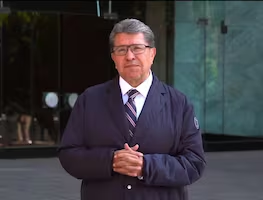Más Información

Inicia pago de la Pensión del Bienestar del bimestre enero-febrero; estas son las fechas de depósito

Violencia en el país evidencía colapso de estrategia de seguridad: PRI; insiste en cambiar el rumbo de combate

Defensa toma protesta al general Maximiliano Cruz Ramos; fungirá como Inspector y Contralor General de División de Estado Mayor

Sheinbaum destaca reducción de homicidios dolosos en último mes de 2024; “Confiamos en nuestra estrategia”, dice

Sheinbaum no hablará de seguridad en reunión con presidentes municipales; revisarán tema de infraestructura
The prime suspect in the brutal slaying of 11 family members is a man who allegedly sought revenge after one of the victims reported that he raped her and he was jailed, a Mexican law enforcement official said Saturday.
The official told The Associated Press that authorities believe two attackers fatally shot the woman and her family, including two girls. The killers also slashed a male victim believed to be the woman's partner, and may have tried to decapitate him.
The official was not authorized to be quoted by name and spoke on condition of anonymity.
The killings took place Thursday night in the remote hamlet of San José el Mirador, in the municipality of Coxcatlán in the central state of Puebla.
Prosecutors said late Friday that two suspects are being sought and they are believed to have fled into the mountains of neighboring Oaxaca state.
Authorities have not identified the victims or the suspects.
The Puebla state prosecutor's office said that one of the dead women had been raped and had a child by one of the attackers, apparently several years ago. Five witnesses survived and were under government protection. They told authorities the attackers arrived at the remote mountain village by foot, opened fire and left.
"Personal conflicts are the main line of investigation," the office said. Officials had previously raised the possibility that the killings had religious overtones, because residents of the largely evangelical hamlet had previously had disputes with Catholics in a nearby community. But that now appears not to have played a role.
The mountain hamlet is so remote that some of the bodies, wrapped in blankets, had to be carried down to the nearest road on stretchers.
The bodies of the victims were taken to the city of Tehuacan for autopsies.
The area has not been particularly hard hit by the drug violence raging in much of Mexico, but drug cultivation and land disputes are not uncommon in the region.





